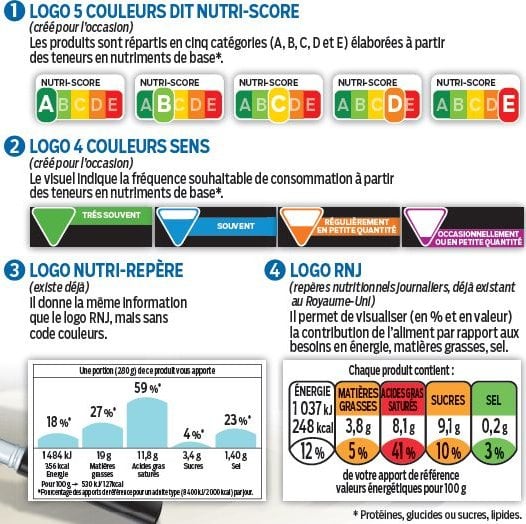French authorities asked ANSES to carry out an evaluation just over a year ago. Published this week, its opinion reads: “ANSES considers that the mechanics of the nutrition information systems […] appears to be of little nutritional relevance.
“The ability of nutrition labels to improve consumer choices therefore appears uncertain, and ANSES does not exclude the possibility that putting in place such systems could lead to consumer behaviour with contradictory effects.
“In the present state of knowledge, the nutritional labels reviewed do not seem to be adapted to the public health issues that are at stake: overweight and obesity, metabolic disorders, cardiovascular diseases and certain cancers.”
But this goes without saying, experts have countered.
Director of nutrition research at the University of Paris, Professor Serge Hercberg developed the 5-C NutriScore nutrition logo which received the formal backing of the governmental High Council of Public Health, HCSP, but was opposed by food industry lobbies. He told FoodNavigator assessing a logo's ability to reduce obesity is“an impossible criterion” and one could not expect any other conclusion.
“ANSES does not conclude that the systems tested are irrelevant to public health issues, but that there is not a sufficient level of proof in relation to these public health issues,” he said.
“It is obvious that a nutrition logo of any kind cannot by itself have a visible and measurable impact on the risk of obesity, cancers, diabetes or cardiovascular diseases. And of course on the basis of the existing scientific work, it is not surprising that this question cannot be answered with a sufficient level of proof.”
The health impact of the nutritional logo can only be considered by combining it with other public health measures and actions, such as public education, marketing restrictions or pricing policies, Hercberg said.
ANSES itself is aware of the limitations of such isolated evaluations.
Head of its evaluation unit Dominique Gombert told Le Figaro: “It is absolutely necessary to evaluate the nutrition information systems in place to see how people behave, [how it impacts] sales and if this drives industry to reformulate its products.”
French consumer group QueChoisir is urging the government to act quickly to bring in one mandatory form before consumers are inundated with a myriad of voluntary ones.
“As isolated proposals multiply, such as the new model of [supermarket] Leclerc, risking to further increase the nutritional cacophony, it is urgent that the government

quickly positions itself on the official model chosen.”
Several types of nutrition logo are currently being trialled across 40 retailers in France in order to determine which has the most meaningful impact. SENS, NutriScore, Nutri-Repère and the UK’s traffic light label will all be tested.
Critics have slammed the exercise, the results of which have yet to be published, as being insufficient to provide measurable results that can be applied at a population level.
President of food industry association ANIA Jean-Philippe Girard said: "I would like to recall the willingness of food companies to provide consumers with reliable, readable and useful information. It is obviously important to take into account this latest opinion of ANSES [...] and the work in progress on the voluntary establishment of a system of nutritional information."
Over a quarter of a million consumers have signed an online petition on Change.org asking the government to use the NutriScore 5-C logo.
